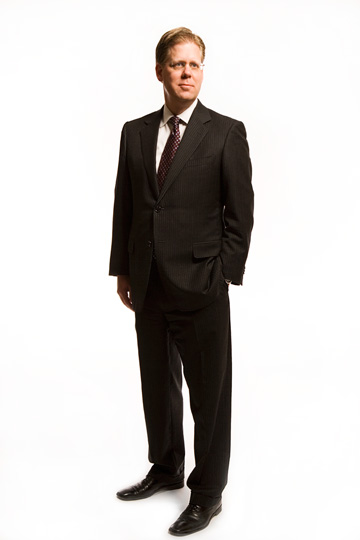Q: What, exactly, are you building?
A: This is a lab—big, open, glass, about 11,000 square feet. Kids will be working on projects that people want solved, some for two days, some a month long. They can live in the lab if they want to. It’s not a typical course, but total immersion.
Q: This sounds like a huge idea.
A: It’s our best hope. We have a small number of engineers, which is not a good thing. And we’ve been producing 1980s-vintage engineers for the 21st century. Changing how we teach them is going to maintain our competitive edge, globally.
Q: What’s going to happen inside the lab?
A: We will put problems in front of the kids about everything that matters: energy, global development, national defense, infrastructure. People pitch us with problems all the time. Federal agencies have backlogs of challenging problems. The philosophy is based on the Skunk Works flat management style where everybody is a peer: professors and students glued together, no layers.
Q: How did this idea happen?
A: We are looking at what people don’t have, the pixie dust. The confidence to attack extraordinary challenges even if they don’t have the background for it. So we looked for an organization on the cutting edge and asked, “How do they stay there? How do they maintain their intensity?”
Q: Were you already familiar with Skunk Works, the lab launched by Lockheed Martin in the 1940s to build XP-80 fighter jets?
A: In 1998, I was a Department of Defense science and technology advisor and flew around to labs in a military airplane, the kind that refueled other planes, with no windows. We were looking for gaps in U.S. technology. We went to Skunk Works, and it stuck with me.
Q: How did you connect Skunk Works and SMU?
A: When I got here, I thought, “What if we ran a Skunk Works for 18-year-old kids?” But how do you call the most secretive lab in the country and ask them to come out of the closet? They signed a contract in two weeks.
Q: Fast.
A: That’s the magic. It’s all about speed. Getting something extremely difficult done, in remarkable speed. They have a history of that.
Q: What else do they do?
A: They take risks. Higher education is risk-averse. We don’t fail. We tell our kids, “It’s bad to fail.” But if you take risks, you have to risk failure. They
believe in successful failure.
Q: Everyone knows that you learn more from mistakes, though, don’t they?
A: Not everybody. There is a cultural phenomenon now that we don’t look at risk and failure as ways of learning. Everyone gets a trophy. So you have risk-averse kids who take the easiest route to success. Do you want your doctor to take the easiest way out?
Q: Certainly not.
A: Especially when we are faced with really great threats, not just in defense, but in the impact on our economy, social structure, our environment. The ultimate value experience lives in a world beyond grades. You can’t always just go back to the dorm room and do calculus problems. We’re hoping for a new ethic of drive and will to get things done, from the people who will go out and make change in the world.





